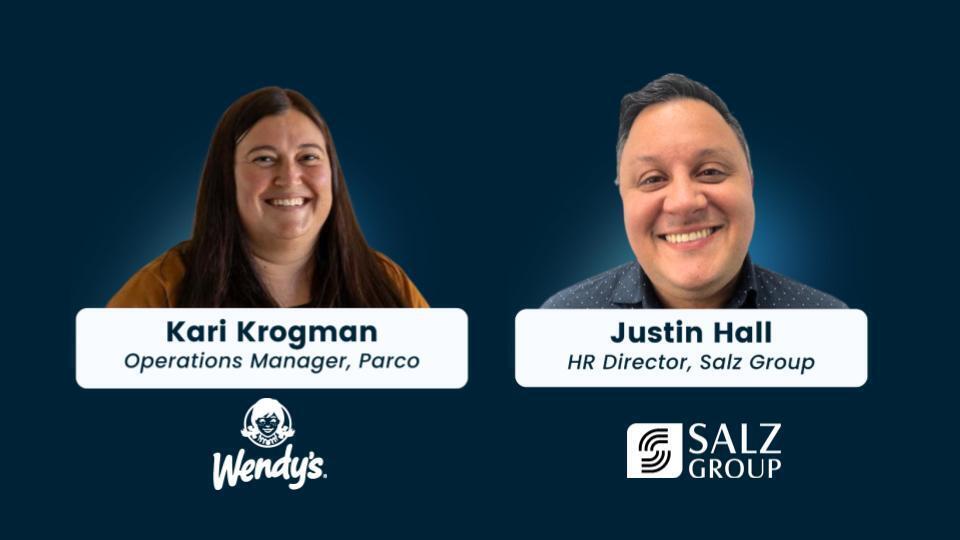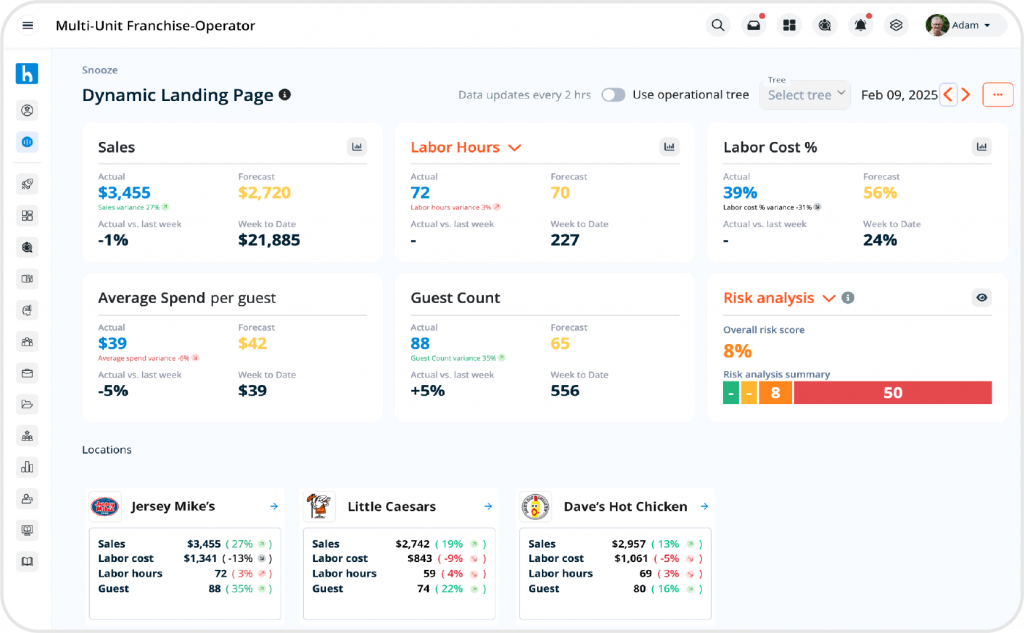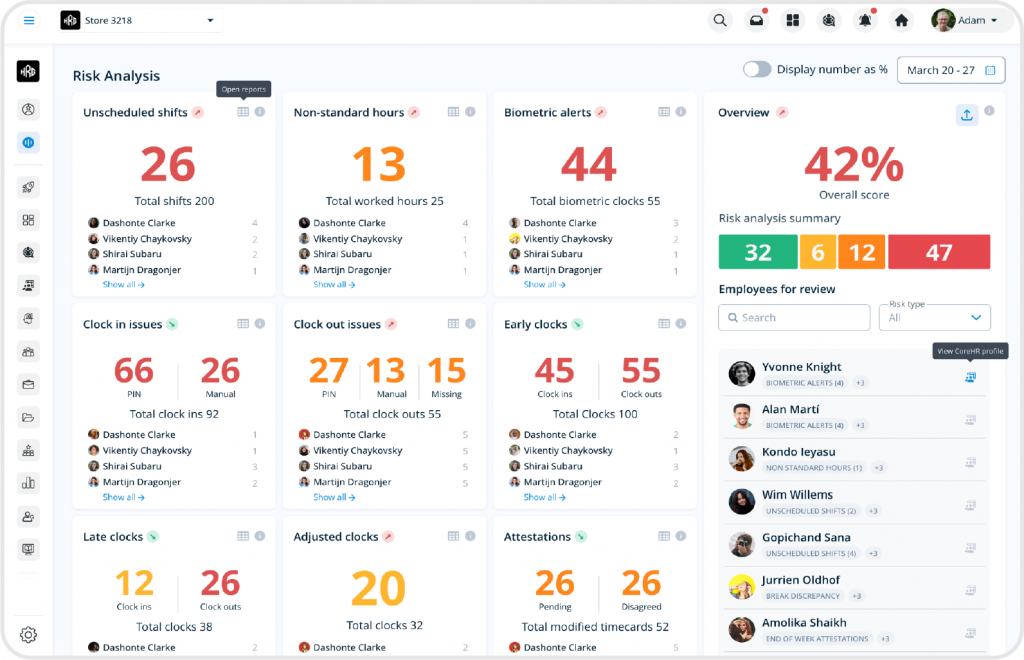Real Talk on Labor Management: How Two Multi-Unit Operators Are Winning in 2025

- By Harri Insider Team | August 7, 2025
Nearly 100 restaurant leaders joined our recent webinar to hear insights from two successful multi-unit operators who’ve cracked the code on profitable labor management.
Kari Krogman is the Operations Manager at Parco, a 28-unit Wendy’s franchise operating across Iowa, Illinois and Minnesota. Justin Hall is the HR Director at Salz Group, operating 36+ Dunkin’, Wendy’s, Taco Bell, and Wingstop locations across NYC.
Together, they tackled some of the biggest challenges hospitality operators are facing right now — from rising labor costs and compliance risks to managing multi-brand complexity and investing in tech that actually works. Here are the key takeaways from the session (and slides from the presentation):
The Investment Mindset: Labor as Revenue Driver
Justin’s contrarian take challenged conventional wisdom: “Investment in labor is investment in sales. No one has ever cut labor and seen sales go through the roof.”
Justin emphasized that successful operators don’t cut labor—they reallocate it strategically. His company’s growth from one Dunkin’ location in downtown NYC’s financial district to 36+ locations proves the point. His example was telling: When Dunkin’ introduced next-generation tap-style service bars (which Salz Group piloted at their Oculus World Trade Center location), the technology didn’t eliminate jobs.
“Production is so much faster that what used to take two people to run can literally be done with one person now and get the same output that we got before. It didn’t cut labor. It increased transactions.”
Real-Time Data Drives Real Results
Kari highlighted the power of actionable data: “Everything starts with a solid forecast. From there, scheduling according to what’s forecasted. If you don’t schedule well, you’re not going to set yourself up or your team for success.”
Her team uses real-time “needed hours” metrics to optimize staffing decisions. “While we begin with a good schedule and approval, making sure we’re forecasting correctly, we really don’t know what the week’s going to come. The needed hours has been critical for us with real life data and great reporting to have real-time updates.”

Multi-State, Multi-Brand Complexity Made Simple
Both operators emphasized that successful multi-unit management comes down to consistency and centralization.
Justin’s philosophy: “At the end of the day, if you go into any of my four brands, our goal is to make sure you have a great experience, provide what you’ve ordered… and make sure that you come and visit us again. They’ve all got to hire people. They’ve all got to fill out paperwork. They’ve all got to get a schedule. It’s lather, rinse, repeat.”
For Kari, managing across state lines requires precision: “One of the challenges that we face is navigating different laws and regulations across state lines, especially with locations positioned right on the border of very different states with very different laws.”
Putting Labor Compliance On Autopilot
Perhaps the most compelling story came from Justin’s Fair Workweek compliance transformation. Starting at 1.3% of weekly payroll in penalties, his team leveraged dashboard technology to systematically address violations.
“We moved just one tile at a time and said, ‘How do we see what’s impacting us the most?’ This board helped us bring penalties down to 0.28% of our weekly payroll, which is phenomenal. We’re now getting into really nitty gritty details to get to 0.15% in the next 60 to 90 days.”
The secret? Making complex compliance simple for managers: “Can I show you a dashboard with a stoplight—red, yellow, green? If your managers don’t know red, yellow, green, we need to have a bigger talk about why they’re a manager for you.”

We don’t avoid penalties — we run a responsible business so we don’t have to pay them.” – Justin Hall
Kari echoed his comment on the importance of real-time labor controls to help proactively monitor and manage compliance risk:
“Real-time labor controls are just as critical. So that’s what Harri has provided us here. It includes ensuring employees clock in and out accurately, take their legally required breaks, leave on time, show up when they’re expected, holding employees accountable is key and it’s not easy when you’re also running a busy restaurant.”
A Simpler Approach To Technology
Both operators stressed the importance of centralized systems. Justin’s rule: “If it can’t patch into [our main platform], I’m not touching it. I just won’t do it because I want to make it easier on an operator.”
Kari echoed this sentiment: “From the hire to the fire, having the one platform has been a huge asset. We used to have five to six different programs and different passwords and whatnot. So having everything in one is huge for my team who aren’t all as techie as I am.”
Real-time dashboards, scheduling approval flows, mobile alerts, and needed-hours reporting — both operators raved about how Harri enables fast, informed decisions across locations, especially in border towns or multi-brand markets.
“We’re in the penny business. Every penny counts.” – Kari Krogman
Building Culture at Scale
Kari manages over 100 communication groups across her 28 locations to ensure every team member stays connected and informed.
“We live by the one team mentality. We are one team, one family… Having a reliable communication tool is critical for us. Something that allows us to reach every employee, whether individually or company-wide.”
Across all their brands and markets, Kari and Justin both emphasized that culture, communication, and consistency are the glue. Harri’s CommsHub allows them to share updates, celebrate wins, and connect with every team member — from GMs to hourly crew.
“We’re one team, one family. That’s our culture. And tech like CommsHub makes it real.” – Kari Krogman
The Bottom Line
When asked about their biggest labor management challenge, Kari summed up the industry reality: “Finding the right price point to keep customers coming back while rising minimum wages across different states and increasing food costs… It’s not about adopting a do more with less mentality. It’s about being intentional and strategic and controlling what truly matters.”
Justin’s closing thought: “Investment in labor is investment in sales. Make this investment, lean into this, and you’re going to see that now they have a conversation with people in both cash registers, and that’s how you grow your business.”
Whether you’re managing 3 stores or 300, the themes were clear:
- Be proactive, not reactive.
- Invest in tools that give your managers superpowers.
- Train, measure, and communicate — relentlessly.
- Labor isn’t a line item. It’s your growth engine.
Email marketing@harri.com to request a live demo of the Dynamic Landing Page and Risk Analysis Dashboard Justin and Kari raved about.





















